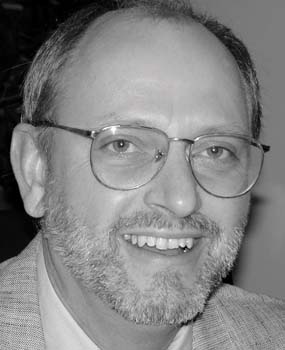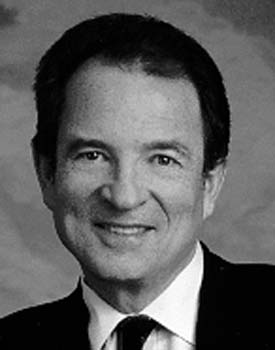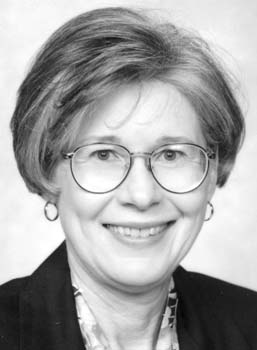Just as spring brought much-needed rain to kick campus greenery into high gear, so it yielded up a just-as-welcome sprinkle of newly appointed deans for three of WSU’s colleges and schools. Susan K. Kovar, who was serving as interim dean of the Graduate School, was named its dean; William D. Bischoff, interim dean of Fairmount College of Liberal Arts and Sciences, also saw the “interim” removed from his title; and Steven K. Hedden, vice dean for academics and research in the College of Fine Arts at the University of Arizona, was appointed dean of WSU’s College of Fine Arts.
All three deans have their educational roots planted deeply in the soil of the Midwest.
Hedden was born in Colby, Kan. — opera star Sam Ramey ’68 was his best friend — and received the BME, MME and PhD degrees from the University of Kansas. Kovar, who is from Cedar Rapids, Neb., earned the bs degree at the University of Nebraska, the MS degree at the University of Illinois, and the PhD degree in physical education, with a minor in higher education administration, at the University of Minnesota.
Born and raised in Ohio, Bischoff received the ba degree from Indiana’s DePauw University and the MS and PhD degrees in geological sciences from Northwestern University, Evanston, Ill.
As longtime faculty members and administrators at their respective universities, all three have more than passing familiarity with the funding-parched grounds common to state-assisted institutions of higher education these days.
No doubt all three would — and will — have plenty to say regarding the financial challenges that loom ominously over their colleges, like towering cumulonimbus clouds presaging stormy weather on the Plains, but for now, The Shocker thought it would be fun to ask them about the books they read, their hobbies and collections, and roads not taken. That other stuff can wait.
A Travelin’ Man
 Since coming to Wichita State in 1984, Bischoff has taught courses in earth system science, introductory geology, oceanography and geochemistry, as well as classes for the interdisciplinary master’s program in environmental sciences. His research focuses on the mineralogy of carbonates and the chemical reactions between these minerals and water systems that accompany the transformation of carbonate sediments to limestone and dolomite. He regularly conducts field research in and around Ambergris Caye, Belize, during spring breaks.
Since coming to Wichita State in 1984, Bischoff has taught courses in earth system science, introductory geology, oceanography and geochemistry, as well as classes for the interdisciplinary master’s program in environmental sciences. His research focuses on the mineralogy of carbonates and the chemical reactions between these minerals and water systems that accompany the transformation of carbonate sediments to limestone and dolomite. He regularly conducts field research in and around Ambergris Caye, Belize, during spring breaks.
“I actually do most of my recreational reading during down time in Belize,” Bischoff says. “Last time, I took E.L. Doctorow’s Billy Bathgate along — I’m a big fan of his book Ragtime — and it was a great read.” In addition to his scientific gear, he packs a selection of what he describes as “trash reading, summer reading” that he mines from the Blue Parrot used bookstore. “I like Michael Crichton, scary stuff, books that I’m going to be able to plow through fairly quickly,” he says, “although Billy Bathgate was a cut above that.” Doctorow’s World’s Fair will accompany him on the next Belize junket.
In a carry-over from his childhood, Bischoff collects pennants. He reminisces, “Our family went on driving vacations all over the country, and I began collecting pennants at national parks and tourist traps. I just liked them. There are a few college and team pennants in there too.” He hasn’t been able to update his collection for some time now, because, he explains, “They used to be made from felt, and they’re not anymore. It’s getting hard to find those older, better-made ones.”
Currently, his collection of perhaps 50 pennants is “displayed” on hangers, covered by plastic, in a closet. “I don’t know quite how to show them off,” he remarks. “So I just take them out every now and then and look at them.”
As for the road not taken, Bischoff remembers that he seemed always to have been on the science track. He was interested in chemistry, geology and biology, but, he says, “I just absolutely fell in love with geology from my first college class onward. It was so exciting to hear about plate tectonics and continental drift. I’ve been hooked ever since.” Noting that since both geology and his research incorporate aspects of chemistry and biology, he declares, “I chose the best of all possible worlds.”
Music of My Heart
 Hedden, whose specializations include research in music education, the psychology of music, tests and measurements in music and the healing aspects of music, taught at the University of Kansas, the University of Iowa for 15 years, and the University of Arizona for another 15 years as professor and coordinator of music education. He was named associate dean for academic affairs in AU’s College of Fine Arts and the college’s vice dean for academics and research in 2000.
Hedden, whose specializations include research in music education, the psychology of music, tests and measurements in music and the healing aspects of music, taught at the University of Kansas, the University of Iowa for 15 years, and the University of Arizona for another 15 years as professor and coordinator of music education. He was named associate dean for academic affairs in AU’s College of Fine Arts and the college’s vice dean for academics and research in 2000.
For reading material, Hedden says that he tends to select books with positive messages. “I just re-read Eric Booth’s The Everyday Work of Art,” he comments. “The whole point of the book is to remind people that the arts are a part of daily life, that art is not apart. I keep going back to it again and again, just for the joy of reading it.”
More recently, William Byham’s Zapp: The Lightning of Empowerment has impressed him: “It’s about the conditions that make people happy in the workplace, that keep them excited about coming to work, every day. It’s a real ‘upper,’ a refreshing antidote to depressing realities that negatively impact everyone, from the top down.”
While Hedden is not a collector, he does have hobbies. He likes to walk at least five times a week to relieve stress and take in the scenery. He also enjoys sports — “But at my age, I’m very much the observer,” he chuckles —and is partial to basketball, both professional and collegiate. A wide-ranging and avid reader of magazines, he will miss “a great place in Tucson, Bookman’s, that sells used books and magazines. I go trolling there for all kinds of magazines: arts magazines, Discover, Scientific American, Smithsonian. There’s no limit to what I’ll find interesting!”
Considering what other career he might have chosen, Hedden says, without hesitation: “Medicine. I would have liked being a physician.” He remembers that he had a good background in math and science, which he continues to enjoy — his PhD minor was in statistics — and he entered college intending to become an engineer or a music teacher. “During my very first semester, I realized that my heart was in the arts and that I needed to follow my heart. It was the right choice, but from time to time you wonder, ‘What if?’”
A Very Good Year
 Having taught physical education at Wayne State College, Wayne, Neb., where she also was head softball coach; Drake University, Des Moines, Iowa; and Emporia State University, Emporia, Kan., where she served as department chair, Kovar came to WSU as chair of the Department of Health, Physical Education and Recreation (now Kinesiology and Sport Studies) in 1991. She was named associate dean of the Graduate School in 1998 and interim dean in 2000. Her specializations include the teaching of physical education, pedagogy and physical education curriculum development, grades K-12.
Having taught physical education at Wayne State College, Wayne, Neb., where she also was head softball coach; Drake University, Des Moines, Iowa; and Emporia State University, Emporia, Kan., where she served as department chair, Kovar came to WSU as chair of the Department of Health, Physical Education and Recreation (now Kinesiology and Sport Studies) in 1991. She was named associate dean of the Graduate School in 1998 and interim dean in 2000. Her specializations include the teaching of physical education, pedagogy and physical education curriculum development, grades K-12.
Like many people, Kovar doesn’t have as much time to read as she’d like. “I do enjoy fiction, best sellers, lots of things off ‘Oprah’s List’,” she says with a laugh. “I loved David Guterson’s Snow Falling on Cedars and The Poisonwood Bible by Barbara Kingsolver. I’m reading her latest book, Small Wonder, right now.” She speculates that books providing insights into human behavior are the ones she remembers the most.
Kovar counts reading among her hobbies, and she also collects wine glasses. “When my husband and I travel, which is not frequently enough, we buy a couple of wine glasses there that remind us of where we’ve been and the fun we had, ” she explains. They commissioned a pair of wine glasses at a glass factory on the Oregon coast, and they have a pair from Chicago and two from Prague, Czechoslovakia, for example. “It’s not a huge collection,” Kovar says, “but they’re all very different. We put the whole mismatched batch out at parties, which is a great way to enjoy the collection — and our memories.”
Thinking about missed career opportunities, Kovar says that for her, there weren’t any. “When I was growing up in Cedar Rapids, a town of 500, girls pretty much had three paths open to them,” she recalls. “You could be a teacher or a nurse, or you could head to the largest city in the state and become a secretary.” Given those options, she thinks she made the wisest choice because, she says, “education is really my passion. I can’t imagine doing anything else, and I don’t think I should be doing anything else. So I am extremely fortunate.”
— Kat Schneider ’72





